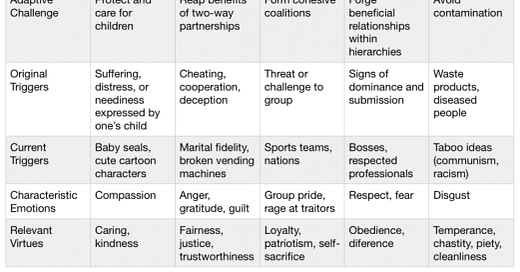This entry is this substack's original intent: Raf's Dvar/Riff Torah -- Recently redirected for the "Is Raf OK?" series (at the well advised impetus of sister Tanya).
Select Parsha Highlights
Korach and his posse (er, clan) speak up and demand a role in the holy rites.
It doesn’t go well:
לב: וַתִּפְתַּ֤ח הָאָ֨רֶץ֙ אֶת־פִּ֔יהָ וַתִּבְלַ֥ע אֹתָ֖ם וְאֶת־בָּֽתֵּיהֶ֑ם וְאֵ֤ת כָּל־הָֽאָדָם֙ אֲשֶׁ֣ר לְקֹ֔רַח וְאֵ֖ת כָּל־הָֽרְכֽוּשׁ
The earth “opened its mouth,” swallowing them and their households, and all the men who were with Korach and all their property.
And much more.
I have been reading about Moral Foundations Theory (MFT), a framework popularized in recent years by Jonathan Haidt. While Haidt uses MFT as a way of understanding how an intelligent, well-intentioned populace can be politically divided, another author (Shellenberger) uses MFT to try to understand why cities and communities adopt different policies to address homelessness (particularly vis-a-vis mental illness and addiction).
MFT, as I understand it, is a distillation of “evolutionary psychology.” MFT’s six values are: Care, Fairness, Loyalty, Authority and Sanctity. From the essay "Understanding Political Differences Through Moral Foundations Theory:"
Korach's challenge to Moses in the Parsha:
ג: וַיִּקָּֽהֲל֞וּ עַל־משֶׁ֣ה וְעַל־אַֽהֲרֹ֗ן וַיֹּֽאמְר֣וּ אֲלֵהֶם֘ רַב־לָכֶם֒ כִּ֤י כָל־הָֽעֵדָה֙ כֻּלָּ֣ם קְדשִׁ֔ים וּבְתוֹכָ֖ם יְהֹוָ֑ה וּמַדּ֥וּעַ תִּתְנַשְּׂא֖וּ עַל־קְהַ֥ל יְהֹוָֽה
They combined against Moses and Aaron and said to them, “You have gone too far! For all the community are holy, all of them, and יהוה is in their midst. Why then do you raise yourselves above יהוה’s congregation?” [JPS]
Imagine there are two groups before Moses: The Crowd of Korach (who said the above) and The Rest.
How are their values split?
MFT suggests that human character, at least vis-a-vis groups and polities, are built on the same six core ingredients, but with differences in emphasis and priority.
Korach's Crowd seems to elevate Fairness and Sanctity over Loyalty and Authority. Korach's perspective is that Moses and Aaron are not being fair, and this sense of injustice has pushed aside the communal need to defer to Authority. It also motivates Korach's Crowd to cross a boundary of Sanctity.
It isn't that Korach's Crowd doesn't care about Loyalty or Authority or Sanctity--they made it this far under the leadership of Moses, and there were some pretty hairy incidents on the way!--it's that their sense of Fairness has become activated.
I wonder if this activation is blinding.
Much is made of the wealth of Korach's family. Many discussions of this incident revolve around Korach's hurt ego. That this pushed him to demand a visible role in the holy rites.
And truly, most of us have seen that wealth and narcissism are frequently concurrent: Such a person demands compliments, gifts and strokes.
The gift of MFT is that it lets us pose it as a matter of group, or social, dynamics. Instead of pathologizing Korach and his Crowd (no matter how warranted a diagnosis may be!), we are dealing with not one person but a group. The people in that group want to persist as a group. (Were this not the case, folks would just leave--there was no border fence.) So what is it, in the group dynamic that leads to Korach's Complaint?
On committees and boards, I saw a respected elder hear people out many times. Even when clearly unacceptable things were being proposed. "Why do you let them go on and on? [About something that can never happen in practice.]"
"Because people need to feel that they had their say. Then they go along better with the final decision."
Whether this applies to Korach, I can't know. The final verdict [Korach's Crowd being swallowed by the earth], I am afraid, supports a proposal to pathologize.
When ground shaking isn't possible (or revolution undesirable), understanding each others hierarchy of values may be the best we can do.
(Thanks to A.K.)



